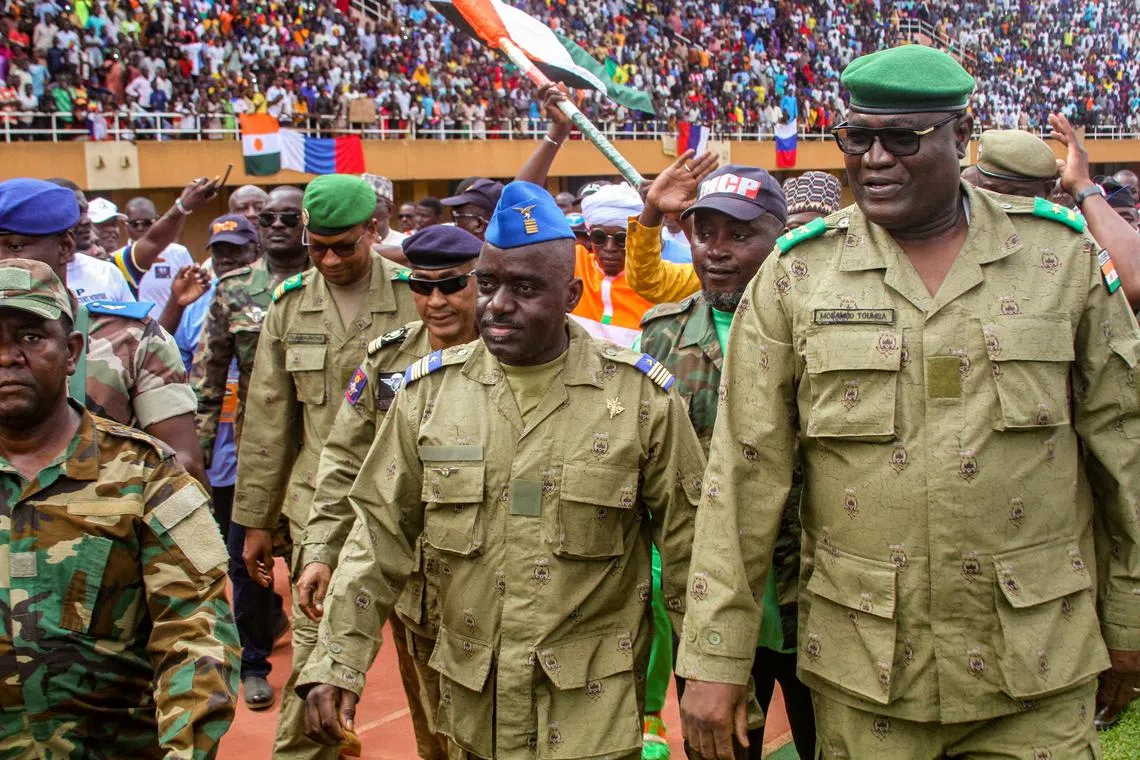Niger hit with more sanctions as junta rebuffs latest diplomatic mission
Sign up now: Get ST's newsletters delivered to your inbox

Members of a military council that staged the coup in Niger attend a rally at a stadium in Niamey.
PHOTO: REUTERS
NIAMEY - Niger was slapped with more sanctions on Tuesday, hours after its new military leaders rejected the latest diplomatic mission aimed at restoring constitutional order following a July 26 coup.
Nigeria’s President Bola Tinubu ordered the new sanctions through Nigeria’s central bank, aimed at squeezing entities and individuals involved in the takeover, a presidential spokesman said.
The sanctions were imposed after Niger’s junta denied permission to enter Niger to a joint delegation from West African states, the African Union (AU) and the United Nations, resisting pressure from the United States and the United Nations to come to the negotiating table.
Late on Tuesday, the Economic Community of West African States (Ecowas) confirmed the joint mission had been aborted and said in a statement it would “continue to deploy all measures in order to restore constitutional order in Niger”.
Regional and Western powers fear the coup will destabilise the Sahel region of West Africa,
Border and airspace closures have cut off supplies of medicine and food, hampering UN humanitarian aid. US and Western interests in Niger, a former ally, are also under threat.
“We are still hopeful and we are still trying to achieve a result that is a return to the constitutional order,” US State Department spokesman Matthew Miller told reporters on Tuesday.
Funding for international military education and training, peacekeeping operations, and foreign military financing programs supporting Niger’s counterterrorism capabilities are among the assistance the US has paused since the coup, he said.
Ecowas heads of state are preparing for a summit on Thursday to discuss their standoff with the junta, which defied an Aug 6 deadline to reinstate ousted President Mohamed Bazoum.
Ecowas defence chiefs agreed on Friday on a possible military action plan, which heads of state are expected to consider at their summit in the Nigerian capital, Abuja.
Still, Mr Tinubu’s spokesman said the leaders prefer a diplomatic solution.
“No options have been taken off the table,” the spokesman told reporters in Abuja, adding that “far-reaching decisions” would be taken at the summit concerning the bloc’s next steps.
Explaining the decision to not allow the delegation in on Tuesday, Niger’s junta said it could not guarantee their safety in the face of popular anger. It also denounced “a climate of threatened aggression against Niger”.
The junta had already snubbed meetings with a senior US envoy and another Ecowas delegation.
Under Mr Bazoum, Niger was relatively successful in containing an Islamist insurgency devastating the Sahel region and was an important ally for the West after two of its neighbours rejected former colonial power France and turned towards Russia instead.
The United Nations said Secretary-General Antonio Guterres strongly supported mediation efforts by Ecowas, while US Secretary of State Antony Blinken told French radio station RFI diplomacy was the best way to resolve the situation.
He declined to comment on the future of some 1,100 US troops in Niger, where French, German and Italian troops are also stationed.
Mr Blinken later told the BBC he was worried that Russia’s Wagner mercenaries could take advantage of the instability in Niger to strengthen their presence in the Sahel.
“I think what happened and what continues to happen in Niger was not instigated by Russia or by Wagner, but to the extent that they try to take advantage of it – and we see a repeat of what’s happened in other countries, where they’ve brought nothing but bad things in their wake – that wouldn’t be good,” he said.
Adding to its strategic importance, Niger is the world’s seventh-biggest producer of uranium, the most widely used fuel for nuclear energy.
Russian flags
US Acting Deputy Secretary of State Victoria Nuland flew to Niamey on Monday coup leader General Abdourahamane Tchiani
Last week, Ecowas sent a mission to Niamey led by Mr Abdulsalami Abubakar, a former military ruler of Nigeria, but Gen Tchiani also refused to see him.
In contrast, Gen Tchiani on Monday met a joint delegation from Mali and Burkina Faso, both neighbouring countries where the military has seized power from civilians.
“We will not accept military intervention in Niger. Our survival depends on it,” said Mr Abdoulaye Maiga, a spokesman for Mali’s junta, appearing on Niger state television.
Some pro-coup demonstrators in Niamey have held up Russian flags, which are in fashion according to residents and fabric vendors.
Western allies fear that Niger could go the way of Mali, which threw out French troops and UN peacekeepers and invited in mercenaries from Wagner group after a 2021 coup.
Alongside the Malian army, fighters presumed to be from Wagner have carried out a military offensive, executing hundreds of civilians last year, witnesses and rights groups said, allegations the army and Wagner have rejected.
In a new report seen by Reuters on Monday, UN sanctions monitors said they had also used a campaign of sexual violence and other grave human rights abuses to terrorise the population. REUTERS


